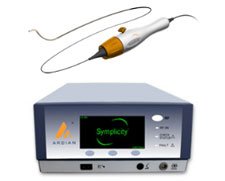
Categorised under:
Interventional Radiology
>
Vascular
>
Renal denervation
Hypertension represents a significant global public health concern, contributing to vascular and renal morbidity, cardiovascular mortality, and economic burden. The opportunity to influence clinical outcomes through hypertension management is therefore paramount. Despite adherence to multiple available medical therapies, a significant proportion of patients have persistent blood pressure elevation, a condition termed resistant hypertension. Recent recognition of the importance of the renal sympathetic and somatic nerves in modulating blood pressure and the development of a novel procedure that selectively removes these contributors to resistant hypertension represents an opportunity to provide clinically meaningful benefit across wide and varied patient populations. Early clinical evaluation with catheter-based, selective renal sympathetic denervation in patients with resistant hypertension has mechanistically correlated sympathetic efferent denervation with decreased renal norepinephrine spillover and renin activity, increased renal plasma flow, and has demonstrated clinically significant, sustained reductions in blood pressure. The SYMPLICITY HTN-3 Trial is a pivotal study designed as a prospective, randomized, masked procedure, single-blind trial evaluating the safety and effectiveness of catheter-based bilateral renal denervation for the treatment of uncontrolled hypertension despite compliance with at least 3 antihypertensive medications of different classes (at least one of which is a diuretic) at maximal tolerable doses. The primary effectiveness endpoint is measured as the change in office-based systolic blood pressure from baseline to 6 months. This manuscript describes the design and methodology of a regulatory trial of selective renal denervation for the treatment of hypertension among patients who have failed pharmacologic therapy.
Credits: Clin Cardiol. 2012 Sep;35(9):528-35.

Did you know you can Register for FREE with this website?
Registration gives you full access to all of the features of WhichMedicalDevice. Find out more ...
WhichMedicalDevice is a FREE resource created by clinicians for clinicians.
Registration is free and gives you unlimited access to all of the content and features of this website.
Find out more...Registration is free and gives you unlimited access to all of the content and features of Which Medical Device. Find out more...
Which Medical Device is a community of clinicians sharing knowledge and experience of the devices and procedures we use on a daily basis. We ask that our members register with us so that we can maintain the unbiased and independent nature of our content. Registration is quick and free.
We do not make your details available to any third parties nor do we send unsolicited emails to our members. You can read our Privacy Policy here.